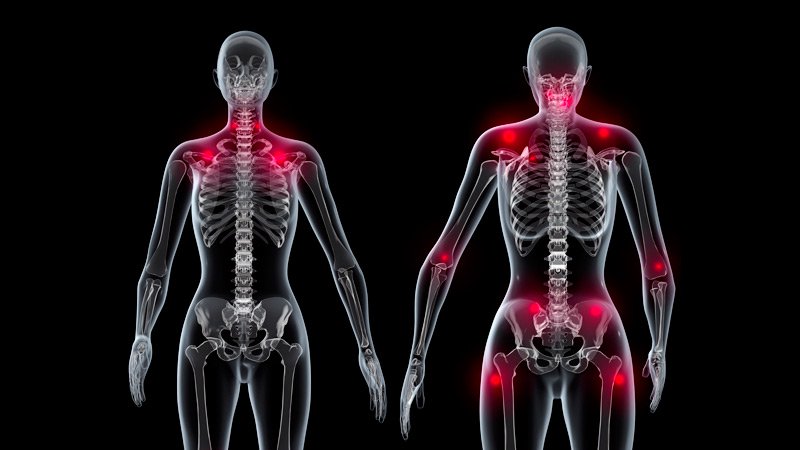If you feel like you ache all over, and are often exhausted for no apparent reason, then learn more about Fibromyalgia. You may be suffering from it and not know it.
What is Fibromyalgia?
Fibromyalgia is a musculoskeletal pain syndrome. The pain is diffuse and chronic in the muscles, tendons and ligaments. It is diffuse pain, because to suffer from fibromyalgia, you should have pain in at least 11 out of 18 tender points throughout the body, on both sides of the body, above and below the waist (eg above from the head, on the chest, on the outside of the elbows, pain high on the hips, etc.)
Also, it is chronic pain, because to be diagnosed with Fibromyalgia you have to feel this generalized pain for at least three months and unfortunately it is more likely that it will continue to bother you for many months, even years.
It is this pervasive and chronic pain that causes you to be constantly exhausted, and until you are diagnosed with Fibromyalgia, you can’t attribute it anywhere, and it leaves you feeling depressed and powerless. Fibromyalgia can be primary or secondary if you suffer from another rheumatic, inflammatory or endocrine disease.
It is difficult to diagnose, which is why you may suffer from it for a long time and not know it. Its diagnosis is made by the specialist rheumatologist by excluding other diseases of musculoskeletal pain. Some medications, such as pain relievers, mild opioids, or antidepressants may help reduce pain.
Self Diagnosis of Fibromyalgia
For an easier diagnosis, French rheumatologists created the FiRST questionnaire ((Fibromyalgia Rapid Screening Test) with 6 simple questions.
If you answer positively to 5 of them, then it is most likely that you suffer from Fibromyalgia.
The 6 questions are as follows:
1) I have pain all over my body
2) My pain is accompanied by a constant and very unpleasant fatigue
3) My pain feels like burning, electric shock or cramping
4) My pain is accompanied by other unusual sensations throughout my body such as pins and needles, tingling or numbness
5) My pain is accompanied by other health problems, such as gastrointestinal and urological problems, headaches or restless legs
6) My pain has a significant effect on my life, especially my sleep and ability to concentrate, making me feel very sluggish in general
Statistical data about Fibromyalgia
- It occurs mainly in women since it is associated with the reduction of serotonin and the dysfunction of neurotransmitters.
- According to studies, it affects 2-8% of the general population.
- 70% of Fibromyalgia sufferers also suffer from Irritable Bowel Syndrome and vice versa.
- Finally, 70% of Fibromyalgia sufferers have a sleep disorder, since brain wave studies during sleep have revealed that people with Fibromyalgia lose deep sleep. That is why they wake up so tired, even after many hours of sleep.
Fibromyalgia Symptoms
Fibromyalgia symptoms are more or less intense depending on the weather, your diet, and your stress level, whether it’s day or night.
The main symptoms are:
- Diffuse pain
- Morning stiffness, for about 15-20 minutes after waking up
- Feeling tired even after many hours of sleep
- Interrupted sleep
- Memory disorders or attention disorders
- Cramps
- Numbness, tingling
- Anxiety
- Dizziness
Fibromyalgia is usually associated with other conditions, such as:
- Irritable Bowel Syndrome
- Wolf
- Migraines
- Restless legs syndrome
- Depression
- Rheumatoid arthritis
- Osteoarthritis
- Urination disorders
Because it affects the whole system, creating sensitivities in many different places, physically and psychologically, it is treated not as a single disease, but as Central Sensitization Syndrome.
If you suffer from Fibromyalgia you are also very likely to be equally sensitive to bright lights, loud sounds, strong smells, touch and cold.
In general, you tend to be particularly sensitive to factors that are normal for other people who do not have Fibromyalgia.
Fibromyalgia also severely affects memory and attention. This foggy state of mind is described by the word Fibrofog, created by combining the words Fibromyalgia (Fibromyalgia) and Fog (Fog.)
The memory and attention disorders it causes are deterioration of memory and use of basic cognitive functions, such as perception, attention, and use of correct vocabulary.
Fibromyalgia Causes
The causes of Fibromyalgia are not specific. It is thought to be caused by a combination of factors, such as genetic and environmental factors. Other possible causes are:
- Family history
- Age (although children can also have Fibromyalgia)
- Gender (although men can also have Fibromyalgia)
- Infections
- Post-traumatic stress
- Rheumatic diseases
- Depression
Diet and Fibromyalgia
There is no specific recommended diet. But because the foods you choose directly affect your psychology and energy levels, which are directly related to Fibromyalgia, it is recommended that they be nutritious for your mind and body. It also helps to keep your weight at a good level.
Avoid tea, coffee and alcohol in the evening, as they will worsen your already frequently interrupted sleep. Prefer some natural herbs, such as chamomile, which will relax you and improve the quality of your sleep.
Exercise is recommended
Regular exercise reduces symptoms. The European Organization for Rheumatic Diseases EULAR recommends the following steps: the patient, after being informed about exactly what Fibromyalgia is, should shape his life accordingly and follow an individualized exercise program.
According to studies, the most suitable exercise for Fibromyalgia sufferers is aerobic exercise. Other recommended exercises are walking, cycling and swimming.
Exercise should be done in moderation, and gradually, so that it does not burden you with the existing feeling of fatigue, but provides you with energy and well-being, contributing, at the same time, to a better quality of sleep.
Give yourself time. At first, you will feel more tired, but as the muscles strengthen, at a gentle and gradual pace, you will feel stronger to increase your effort accordingly.
Psychology of Patients with Fibromyalgia
Fibromyalgia is directly linked to stress and sometimes depression. Increasing stress worsens the widespread pain in your body.
Therefore, identifying what stresses you out and reducing their presence in your daily life is one of the most important steps you can take.
Observe yourself, and learn how to relax your mind, body, and senses. If you are depressed, do not hesitate to seek help from a specialist. You are always your first healer, but it is legitimate in this endeavour to have the experts you need by your side to combat the pain, mentally and physically.
Energy and Fibromyalgia
Fibromyalgia means widespread pain throughout the body. This certainly means blocked feelings, and especially emotional pain, that has spread throughout the body, blocking the natural flow of energy.
When you feel peace within yourself and with those around you, the pain will disappear or at least be greatly reduced. Send love and light into every part of your body, and feel the bright, warm energy dissolve fear. Release the pain, release your life.
Energy Healing – Your Growth Guide
Your body, soul and mind are indissoluble, they are one. By healing the body, the soul is soothed. Healing the soul, the body calms.
Come today to discover the energy healing that is right for you, the one that releases pain from your body and soul. Each service works in addition to the instructions of your doctor or psychologist. No medications are provided.


